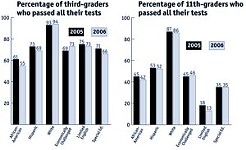Are We Sucking the Trinity Dry?
Hays County residents call for creation of conservation district
By Rachel Proctor May, Fri., Oct. 14, 2005

Conventional enviro wisdom holds that the problem with the Texas Commission on Environmental Quality is not that it lacks the rules and regulations to keep Texas' skies blue and its water clear, but that TCEQ often just doesn't enforce the rules it has. When it comes to protecting groundwater resources in southwest Travis County, that argument certainly rings true: Fifteen years after the Legislature passed a law requiring Central Texas residents to regulate their groundwater through locally managed districts, the TCEQ hasn't done its part to make that happen.
"We're aware that area doesn't have a groundwater district," said Kelly Mills, senior staff geologist with the TCEQ. "We're aware we have to impose a groundwater conservation district. But it's not on our workload."
The area to which he refers is the southwest corner of Travis Co. – roughly west of FM1826 and south of the Colorado River – which lies atop the Trinity aquifer. (In addition, some of the rain that falls onto this land flows downstream, eventually recharging the Edwards Aquifer and feeding Barton Springs, a phenomenon you've probably heard a thing or two about.) Like any aquifer, there's only so much water in the Trinity. For tens of thousands of central Texans who depend on their wells, a very real concern is that too many new neighbors could leave them high and dry. A 2000 study by the Texas Water Development Board found declining water levels in many Trinity wells, and predicted future demand that could exceed the Trinity's capacity. Some area residents say it's already happening.
"In recent years, we've had problems with wells going dry," said Terry Tull, who led a regional water-quality planning process, and whose Hays Co. home depends on Trinity water. "I'm very concerned, and everyone in this area is or ought to be concerned."
No state agency regulates groundwater. Instead, the century-old Rule of Capture says that whatever lies beneath your bit of Texas is yours for the pumping – may the biggest pump win. The main line of defense for the guys with the little pumps are groundwater conservation districts, or GCDs, which monitor and regulate how much pumpers can pump. These entities, run by locally elected boards, are typically created by the Legis-lature and confirmed through the vote of local residents – if the residents think they're a good idea, that is. After all, GCDs are one more layer of government that need to be funded by fees or taxes, neither of which tend to be particularly popular. The only places where GCDs are not voluntary are certain high-growth areas where the Legislature has decided that future pump battles seem inevitable. These areas are called priority groundwater management areas and chapter 35 of the Texas Water Code states that if PGMA residents don't create a GCD of their own, the TCEQ must step in and create one for them.
The Legislature defined the Hill Country PGMA in 1990 as a seven-county region running from southwest Travis Co. to Bandera Co. Currently, only southwest Travis and Northwest Comal counties still lack GCDs. Andrew Backus, who is on the board of the Hays Trinity GCD, which shares a border with the GCD-less zone, complains that if Travis Co. groundwater remains unregulated, it could threaten Hays Co. wells – after all, the aquifer doesn't recognize county lines. He believes the fact that TCEQ hasn't stepped in is indicative of a larger pattern. "The governor's office does not make environmental enforcement a priority," Backus said, "as demonstrated by TCEQ's lack of enforcement of its own rules."
The kind of dispute that can arise in the unregulated zone is illustrated by a recent permit application filed by the Golf Club at Circle C. As part of an irrigation-system upgrade, the club applied to TCEQ to divert stormwater into large reservoirs for slow release over the greens. However, the application drew attention to the golf club's two existing unregulated wells – they are located about 10 feet within the GCD-less zone – which will continue to keep the greens green until the reservoirs run out.
The Village of Bear Creek Oaks (an incorporated subdivision across the road from the club), the city of Austin, the Barton Springs/Edward Aquifer GCD, and the Hays Trinity GCD all filed letters with the TCEQ raising concerns about the unregulated wells and asking for a public meeting to discuss the issue. (The LCRA also protested the application, but for an entirely different reason: That agency claims the right to the club's stormwater.) According to supporting data in the application, the greens drink up about 85 million gallons of water a year, and as City of Austin hydrogeologist Nico Hauwert points out, the club's thirst will be greatest during times of drought. In those times, "basically all the water they're using will be coming out of those wells," Hauwert said, "and that's a lot of water."
Chip Gist, general manager of the club, said he was a little baffled by the fuss over his wells, particularly because the million-dollar upgrade to the irrigation system will allow the club to use about 20% less water overall. "We're as concerned about water and groundwater and surface water as anyone else," Gist said. "We're putting our money where our mouth is."
Still, when things get really dry, no mechanism exists to balance the club's needs with those of its neighbors. If the wells were a few feet east, for example, they would lie within the BSEA GCD, which would require a drought management plan that would likely prioritize homeowners' wells over the club's. County residents expect to see more of such disputes in the future, which is why Christy Muse of the Hill Country Alliance, a coalition of Hill Country residents, says her group is looking into possibilities for getting a GCD going on their own. "We're recognizing the need for a groundwater conservation district and looking into ways we can get one started," Muse said. "It's crazy that it hasn't happened yet."
Got something to say on the subject? Send a letter to the editor.








